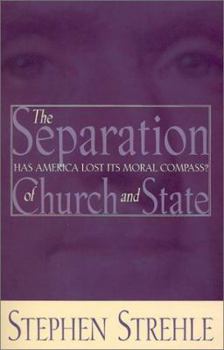The Separation of Church and State: Has America Lost Its Moral Compass?
Select Format
Select Condition 
Book Overview
This book challenges the notion that one can divorce religion from politics. The author contends that inalienable rights grew out of the western religious tradition of natural law, egalitarianism out... This description may be from another edition of this product.
Format:Paperback
Language:English
ISBN:1563841851
ISBN13:9781563841859
Release Date:March 2000
Publisher:Huntington House Publishers
Length:187 Pages
Weight:0.40 lbs.
Dimensions:0.5" x 5.4" x 8.4"
Customer Reviews
3 ratings
separation of church and state
Published by Thriftbooks.com User , 20 years ago
stephen stehles book, the separation of church and state, is truly insightful and accurate. man has invented and implemented every imaginable form of government without achieving long term success. our american ancestors studied the reason(s) for all past government failures; and concluded unanimously that it was because they chose not to place God as lord of all men. in our ancestors biblical wisdom, they sought to form a government using moral law not ethical law. moral laws are absolute. ethical laws are ever-changing. our ancestors recognized that previous governments, whose foundations were built on ethics, eventually became watered-down, lost their original focus, internal chaos developed then dispersement. hum...sound familar?
The Perils of Keeping the Wall
Published by Thriftbooks.com User , 21 years ago
This new book by an accomplished scholar of church history contains a reasoned but firm argument against the current trends in legal and political philosophy as well as against the ideas of liberal theologians regarding the important and timely problem of the relationship of church and state. Strehle clearly uncovers the flaws in the current prevailing viewpoints, both from a historical standpoint and a philosophical/theological viewpoint. Essentially, he argues that the wall of separation notion is one which can only be called historically naive; religion has always been a vital part of the life of any nation. In fact, it is an element inseparable from any aspect of a nation. Most of the book is historical in orientation, but in the process of tracing the modern church-state problem, Strehle does not fail to place appropriate blame on both liberals (theological and political) and conservatives of the "knee jerk" variety. This is a book well worth reading for its clear, succinct, and logical approach.Marc A. ClausonCedarville University
A Thoroughly Researched and Insightful Analysis
Published by Thriftbooks.com User , 22 years ago
The author's thesis is that it is impossible to separate religious and political ideals and that the call for the separation of church and state is a political device used by "left-wing forces to rid society of religious people and their influence." Further, he contends that the vacuum of traditional religious beliefs left by this policy does not go unfilled. The very left-wing groups that promote separation of traditional religious beliefs from the workings of government insert their own secular beliefs in their stead whenever and wherever possible. He says left-wing groups such as the ACLU, People for the American Way, etc. "...inculcate values in a most absolute and legalistic manner but deny any connection between their ideas and religion. It is their opponents ideas that must be labeled as religious and kept from the public forum." He says that it is this strategy that left-wing groups use to infiltrate their beliefs into society and therefore, how they are able to influence government policy.Chapter 1, "The Puritan Heritage" In this chapter the author shows that most of the ideological building blocks of American society and government have their roots in Protestantism and, most directly, in Puritanism. Among them: equality of all individuals in the political process (i.e. - democracy), individual rights, free markets, the American work ethic, and even capitalism. Very enlightening and interesting.Chapter 2, "Reasons, Morals, and Faith" In this chapter the author makes it obvious that he is a very religious man. By my understanding, this chapter is one long argument about why it is better to use the help of traditional religion (and faith in God) to formulate the moral and ethical principles by which to run a government than to formulate those principles from reason alone (i.e.- reason divorced from religion).Chapter 3, "Secular Atheism" The author defines atheism and relates the ideas of some famous thinkers on atheism and religion. Voltaire's ideas and Thomas Jefferson's ideas are given several pages each. The Jefferson discussion was particularly interesting as it showed Jefferson was hypocritical concerning the separation of church and state. (He saw to it that his University of Virginia was state funded.)Chapter 4, "Left vs Right" This is the most interesting chapter of the book. In it the author reveals how the left insidiously carries out its war of ideology against traditional religious beliefs in order to mitigate their political influence and enhance that of their own beliefs. He maintains that the main instigators and soldiers of this war are ivy league humanities professors. Like the leaders of a cult, they brainwash their students - and the entire campus - by practicing intolerance against anything but the party-line beliefs of multiculturalism, moral relativity, etc., and castigate anyone who strays.




